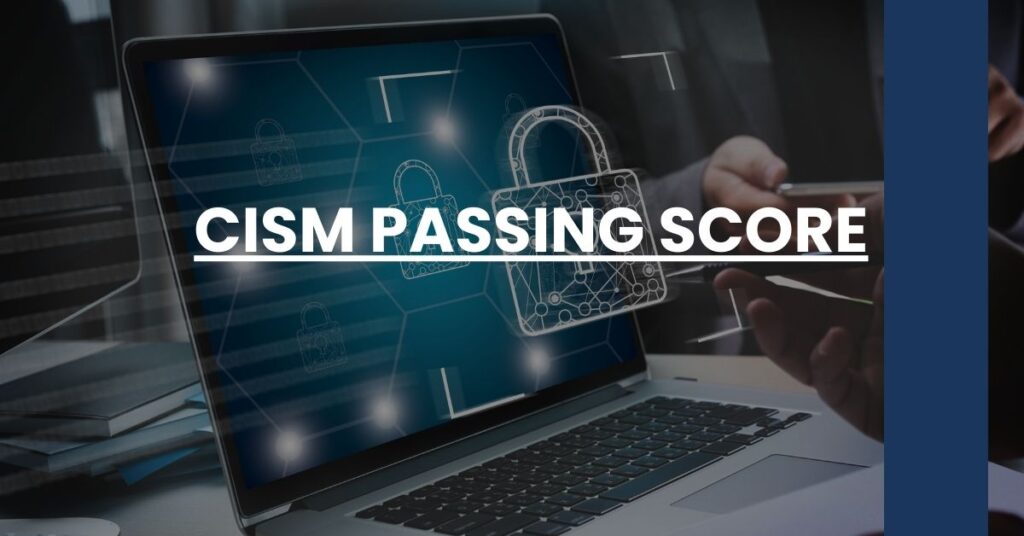To pass the Certified Information Security Manager (CISM) exam, you’ll need a score of at least 450 out of 800. Achieving this score indicates that you have met the knowledge standards set by ISACA, showcasing your expertise in information security management.
In the content that follows, you’re about to unlock:
- Structured insights into how this passing score factors into the CISM certification process.
- Tips on refining your study strategy to ensure you meet or exceed the passing threshold.
By the end of this article, you’ll be equipped with targeted knowledge preparing you to step confidently into the CISM exam and emerge with the credentials to advance your career.
- Understanding CISM Certification
- The Scoring Basics of the CISM Exam
- Breaking Down the CISM Exam Structure
- How is the CISM Score Calculated?
- The CISM Passing Score Explained
- Preparing for the CISM Exam
- Frequently Asked Questions about CISM Scores
- Why Some Professionals Don’t Pass on the First Try
- How to Interpret Your CISM Score
- Evaluating Your Study Approach Based on Scores
- Tips for Success on the CISM Exam
- Conclusion: The Path to CISM Certification Success
Understanding CISM Certification
Certified Information Security Manager, or CISM, is a globally recognized certification that validates your expertise and commitment to managing enterprise information security programs. If you’re eyeing a leadership position in IS security, risk management, or compliance, this certification can be indispensable to your career growth.
Offered by ISACA, the certification process for CISM demands not just passing an exam, but also adherence to a code of professional ethics, continuous education, and a demonstration of work experience in information security management.
The Value of CISM Certification
Becoming CISM-certified can set you apart in the job market. It signals to employers that you not only have the requisite knowledge but also the practical experience to manage and adapt to the complex landscape of information security.
To earn this prestigious certification, however, you must concur with the decisive CISM passing score. Let’s dive deep into what it takes to earn a score that not only meets but surpasses the baseline.
The Scoring Basics of the CISM Exam
The CISM exam’s scoring range is from 200 to 800 points. Your target, the elusive CISM passing score, is 450. Achieving this score isn’t just about memorization; it’s about demonstrating a deep and comprehensive understanding of information security management principles.
Understanding the Scale
Your score is a scaled representation showing how you fared against the required standard. Meeting or exceeding the 450 mark signifies that you’ve mastered the body of knowledge necessary to succeed as an information security manager.
Breaking Down the CISM Exam Structure
The exam itself consists of 150 multiple-choice questions that you’ll need to tackle within a four-hour timeframe. These questions span four core domains you might already be familiar with:
- Information Security Governance
- Information Risk Management
- Information Security Program Development and Management
- Information Security Incident Management
While each domain carries a different weight in the overall score, understanding and mastering each section significantly tips the scales in favor of passing. Ensuring you have a balanced grasp will improve your ability to hit that CISM passing score.
How is the CISM Score Calculated?
ISACA uses a sophisticated process of converting raw scores to a standardized scale—ensuring that your score accurately reflects your performance, irrespective of the exam version or its difficulty level. This is crucial, as it establishes a level playing field for all examinees.
Grasping the Scaled Scoring System
A common misconception is mistaking raw scores for the final result. However, this isn’t the case; your raw score gets fine-tuned to account for different question sets and their varying levels of complexity.
The CISM Passing Score Explained
Regularly set and scrutinized by the ISACA Certification Committee, the passing score of 450 is a benchmark that denotes you’re adept enough in the essential knowledge areas. Its establishment involves a rigorous process taking into account several psychometric and statistical methods to ensure fairness.
The Significance of 450
This magic number is designed to assure that professionals who pass the CISM exam possess a consistent level of skill and proficiency demanded by the dynamic information security field.
Preparing for the CISM Exam
Comprehensive preparation is key to attaining or even surpassing the CISM passing score. Various strategies can enhance your study plan, such as tackling official ISACA study materials, engaging in study groups, and systematically reviewing each domain your exam will cover.
Embarking on a Study Plan
Given the breadth and depth of the exam, here are a few suggestions to optimize your prep:
- Leverage Official Resources: Make use of ISACA’s official CISM Review Manual and question database for up-to-date and relevant material.
- Join a Study Community: Learning with peers can solidify your understanding and provide new insights into complex concepts.
- Simulate the Exam Environment: Practice under conditions that mirror the actual exam to build confidence and manage time more effectively.
By embracing a multifaceted approach to your preparation, you’re improving your odds of achieving a CISM passing score. It’s not just about what you study, but how you study it. With your diligence and structured strategy, the next step awaits – conquering the exam and joining the ranks of CISM-certified professionals.
Frequently Asked Questions about CISM Scores
As you edge closer to taking the CISM exam, you may find that questions about the scoring process spring to mind. Let’s address some of the most common queries to clarify any confusion you might have.
When Will I Receive My Exam Results?
Your exam results are a pivotal moment on your CISM journey. ISACA understands this and endeavors to deliver your official score within 10 working days post-exam. However, a preliminary score is typically available immediately after you complete the exam, giving you an early indication of your performance. For an in-depth look at the score reporting process, refer to the support provided by CyberVista.
Can I Retake the Exam If I Don’t Pass?
Certainly. If the cism passing score eludes you on your first attempt, don’t lose heart. ISACA allows you to retake the exam, offering additional opportunities to reach that all-important cism passing score. Use your initial attempt as a learning experience to strengthen your preparation for your next sitting.
Is My Score Valid for a Specific Period?
The potent relief or joy of passing the CISM exam comes with a question—how long does this triumph last? Thankfully, your cism passing score remains valid as you gather the required work experience and apply for certification within five years.
Why Some Professionals Don’t Pass on the First Try
Reflecting on the experiences of others can offer you valuable lessons. Many professionals don’t attain the cism passing score on their initial attempt due to a variety of reasons. A prevalent issue is a narrow focus on certain topics at the expense of gaining a broad understanding of all exam domains. To prevent this from becoming your stumbling block, balance your prep work and sharpen your strengths across all areas.
How to Interpret Your CISM Score
Once you receive your CISM exam score, interpreting it correctly is a crucial step. ISACA provides a score report that breaks down your performance by domain, helping you understand where you excelled and where you need improvement. Use this feedback as a constructive tool to better your grasp on weaker areas. If you’re brewing questions about this score interpretation, CyberVista offers additional insights.
Evaluating Your Study Approach Based on Scores
Should you find yourself facing a score below the cism passing mark, it’s an opportunity, not a downfall. Analyze your results carefully. What domains did you score low in? Are there patterns in the types of questions you missed? Use this information as a diagnostic tool to retarget your study efforts, ensuring that when you retake the exam, you’re armed with refined tactics and a deeper understanding.
Tips for Success on the CISM Exam
Passing the CISM exam isn’t solely about hard work; it’s also about smart work. Implementing strategic tips into your study routine can make all the difference in navigating toward that cism passing score.
- Domain Mastery: Be conscious of the weight assigned to each domain within the exam. Prioritize your study time accordingly, dedicating more effort to heavier-weighted areas without neglecting the others.
- Time Management: Practice pacing yourself through practice exams to ensure you can comfortably address all questions within the allotted exam time.
- Question Analysis: Develop the skill of reading and understanding what each question is truly asking. This means not jumping to conclusions based on familiar terms but taking the time to consider all options.
For additional practical advice, tap into the experiences of those who’ve successfully navigated the CISM exam, such as the insights shared by Vatsal.
Conclusion: The Path to CISM Certification Success
Embracing the path to your CISM certification is both challenging and rewarding. Understanding the cism passing score and the intricacies behind it is just the first step on your journey. With solid preparation, a clear mind on exam day, and a tactical post-exam analysis—you’re setting the stage for success.
Remember that while attaining the cism passing score is your immediate goal, the true value lies in the knowledge and skills you gain along the way. These will serve as the foundation for a prosperous career in information security management.
You’re not just aiming for a score; you’re building a professional legacy.

